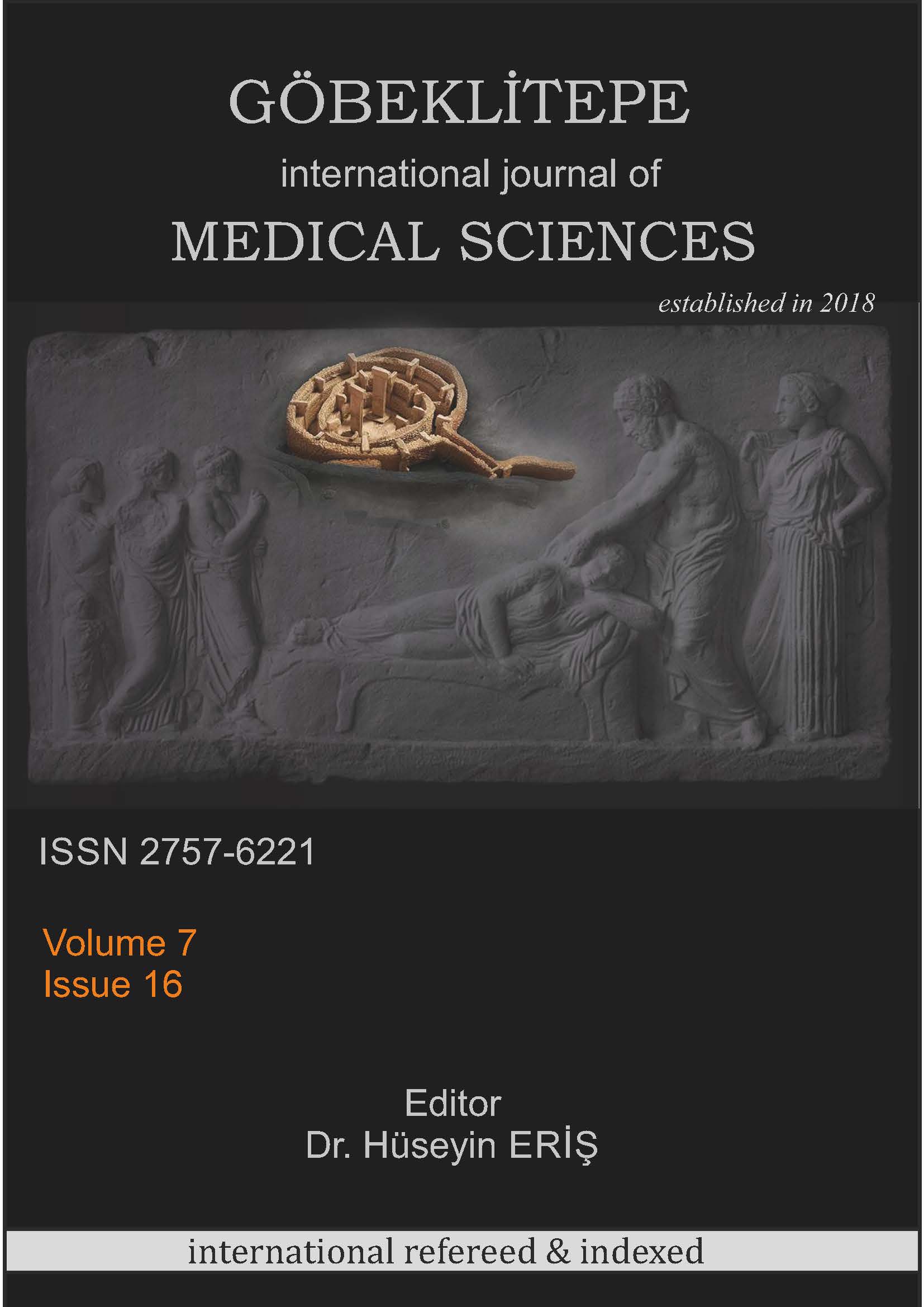The Effects of Adolescent-Parent Conflict on Quality of Life and Anxiety Levels of Parents
The Effects of Adolescent-Parent Conflict
DOI:
https://doi.org/10.55433/gsbd/148Keywords:
Adolescent, parents, conflict, anxiety, quality of lifeAbstract
Objective: This study was conducted to examine the effects of adolescent-parent conflict on parents' anxiety levels and quality of life.
Material and Methods: The research was carried out in descriptive, cross-sectional, relational design. Three forms were used to collect the data: socio demographic information form, State–Trait Anxiety Inventory (STAI), and the short form of the World Health Organization Quality of Life Scale.
Results: It was determined that 96.1% of the parents had conflicts with their adolescent children. It was determined that the trait anxiety scores of the parents showed a statistically significant difference according to the parents' occupation, economic status of the family and the state of conflict with the adolescent. A negative and statistically significant relationship was found between the average anxiety score and the average of quality of life scores in physical, mental, social and environmental domains of the parents who reported having conflict with their children.
Conclusions: As a result of this study, it was determined that almost all of the parents had a conflict with their adolescent children. It was determined that the anxiety levels of the parents who experienced conflict were higher and anxiety negatively affected the quality of life in all domains. It is important for nurses to evaluate the interaction of adolescents and parents, who are in risky groups, within the scope of health promotion and primary protection.
References
Karataş, S., Sertelin Mercan, Ç., Düzen, A. (2016). Ergenlerin Ebeveyn İli̇şki̇leri̇ne Yöneli̇k Algıları: Ni̇tel Bi̇r İnceleme. Balıkesir Üniversitesi Sos Bilim Enstitüsü Derg. 19(36), 237–58.
Yavuzer, Y., Liman, B., Kılıçarslan, S. (2019). Kız Ergenleri̇n Anne-Baba-Ergen Arasındaki̇ Çatışma Durumlarına ve Ebeveyn Tepkilerine İli̇şki̇n Görüşleri̇. Mehmet Akif Ersoy Üniversitesi Eğitim Fakültesi Derg. 50, 90–109.
McKinney, C., Renk, K. (2011). A multivariate model of parent-adolescent relationship variables in early adolescence. Child Psychiatry Hum Dev. 42(4), 442–62.
Silva, K., Ford, C. A., Miller, V. A. (2020). Daily Parent–Teen Conflict and Parent and Adolescent Well-Being: The Moderating Role of Daily and Person-Level Warmth. J Youth Adolesc. 49(8), 1601–16.
Moed, A., Gershoff, E. T., Eisenberg, N., Hofer, C., Losoya, S., Spinrad, T. L. et al. (2015). Parent–Adolescent Conflict as Sequences of Reciprocal Negative Emotion: Links with Conflict Resolution and Adolescents’ Behavior Problems. J Youth Adolesc. 44(8), 1607–22.
Szkody, E., Rogers, M. M., McKinney, C. (2018). Risky sexual behavior: the indirect effects between parent–child relationship quality and quality of life in emerging adults. Qual Life Res. 27(10), 2639–45.
Hamarta, E., Baltacı, Ö., Üre, Ö., Demirbaş, E. (2010). Lise Öğrencilerinin Utangaçlıklarının Algılanan Anne Baba Tutumları ve Problem Çözme Yaklaşımları Açısından İncelenmesi. Sos Polit Çalışmaları Derg. 21(21), 73–82.
Demir, N. Ö., Baran, A. G., Ulusoy, D. (2005). Türkiye’de Ergenlerin Arkadaş-Akran Grupları İle İlişkileri ve Sapmış Davranışlar: Ankara Örneklemi. Bilig. 32, 83–108.
Yavuz, S., Özmete, E. (2012). Türkiye’de genç bireyler ve ebeveynleri arasında yaşanan sorunların “aile yapısı araştırması” sonuçlarına göre değerlendirilmesi. Sos Polit Çalışmaları Derg. 7(29), 9–27.
Eadeh, H.M., Bourchtein, E., Langberg, J. M., Eddy, L. D., Oddo, L., Molitor, S. J. et al. (2017). Longitudinal Evaluation of the Role of Academic and Social Impairment and Parent-Adolescent Conflict in the Development of Depression in Adolescents with ADHD. J Child Fam Stud. 26(9), 2374–85.
Cummings, E. M., Koss, K. J., Davies, P. T. (2015). Prospective Relations between Family Conflict and Adolescent Maladjustment: Security in the Family System as a Mediating Process. J Abnorm Child Psychol. 43(3), 503–15.
Lamis, D. A., Jahn, D. R. (2013). Parent–Child Conflict and Suicide Rumination in College Students: The Mediating Roles of Depressive Symptoms and Anxiety Sensitivity. J Am Coll Heal. 61(2), 106–13.
Kumbas, H., Çam, O., Keskin, G. (2009). Bir grup ergenin aile işlevlerinin değerlendirilmesi. Ankara Üniversitesi Dikimevi Sağlık Hizmetleri Mesl Yüksekokulu Derg. 8(1), 29–39.
Öner, N., Le Compte, A. (1982). Durumluk-sürekli kaygı envanteri. 2. Baskı. İstanbul: Boğaziçi Üniversitesi Yayınevi, 25–80.
The Whoqol Group. (1998). The World Health Organization quality of life assessment (WHOQOL): development and general psychometric properties. Soc Sci Med. 46(12), 1569–85.
Eser, E., Fidner, H., Fidaner, C., Yalçın Eser, S., Elbi, H., Göker, E. (1999). Whoqol-100 and psychometric characteristics of WHOQOL-bref. 3P Derg. 7(January), 23–5.
Bilsky, S.A., Friedman, H.P., Karlovich, A., Smith, M., Leen-Feldner, E. W. (2020). The interaction between sleep disturbances and anxiety sensitivity in relation to adolescent anger responses to parent adolescent conflict. J Adolesc. 84, 69–77.
Jozefiak, T., Larsson, B., Wichstrøm, L., Mattejat, F., Ravens-Sieberer, U. (2008). Quality of Life as reported by school children and their parents: A cross-sectional survey. Health Qual Life Outcomes. 6(1), 1–11.
Yavuz, S., Özmete, E. (2012). Türkiye’de genç bireyler ve ebeveynleri arasında yaşanan sorunların «aile yapısı araştırması» sonuçlarına göre değerlendirilmesi. Sos Polit Çalışmaları. 29, 9–27.
Maksimovic, N., Zaric, M., Reljic, V., Nikolic, M., Gazibara, T.(2020). Factors associated with improvement of quality of life among parents of children with atopic dermatitis: 1‐year prospective cohort study. J Eur Acad Dermatology Venereol. 34(2), 325–32.
Marciano, R. C., Cardoso, M. G. F., Vasconcelos, M. M. A., Paula, J. J., Oliveira, E. A., Lima, E. M. (2020). Depression, anxiety and quality of life impairment in parents of children with functional lower urinary tract dysfunction. J Pediatr Urol. 16(6), 838.e1-838.e7.
Orengul, A., Gormez, V., Tarakcioglu, M., Bikmazer, A. (2020). Depression in Turkish children may affect childrens and their parents quality of life more than other psychopathologies: A single-center study. Psychiatry Behav Sci. 10(2), 55.
Khoshhal, S., Al-Harbi, K., Al-Mozainy, I., Al-Ghamdi, S., Aselan, A., Allugmani, M. et al. (2019). Assessment of quality of life among parents of children with congenital heart disease using WHOQOL-BREF: A cross-sectional study from Northwest Saudi Arabia. Health Qual Life Outcomes. 17(1), 1–8.
Shek, D. T. L., Liang, L. Y. (2018). Psychosocial Factors Influencing Individual Well-Being in Chinese Adolescents in Hong Kong: a Six-Year Longitudinal Study. Appl Res Qual Life. 13(3), 561–84.
Videbeck, S. (2017). Anxiety, Anxiety Disorders, and Stress-Related Illness. In: Psychiatric-Mental Health Nursing. 7th ed. Philadelphia: Wolters Kluwer -- Medknow Publications, 226–51.
Downloads
Published
Versions
- 2023-03-29 (2)
- 2023-03-22 (1)
How to Cite
Issue
Section
License
Copyright (c) 2023 Göbeklitepe Sağlık Bilimleri Dergisi

This work is licensed under a Creative Commons Attribution 4.0 International License.




